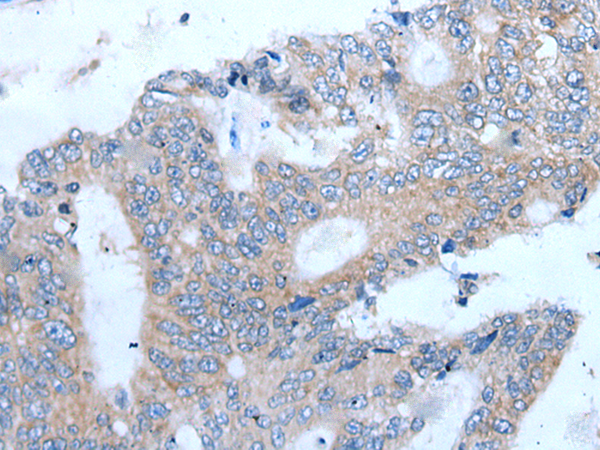
| WB | 咨询技术 | Human,Mouse,Rat |
| IF | 咨询技术 | Human,Mouse,Rat |
| IHC | 1/25-1/100 | Human,Mouse,Rat |
| ICC | 技术咨询 | Human,Mouse,Rat |
| FCM | 咨询技术 | Human,Mouse,Rat |
| Elisa | 1/5000-1/10000 | Human,Mouse,Rat |
| Aliases | CT58; WISP2; CTGF-L |
| Host/Isotype | Rabbit IgG |
| Antibody Type | Primary antibody |
| Storage | Store at 4°C short term. Aliquot and store at -20°C long term. Avoid freeze/thaw cycles. |
| Species Reactivity | Human |
| Immunogen | Synthetic peptide of human CCN5 |
| Formulation | Purified antibody in PBS with 0.05% sodium azide and 50% glycerol. |
+ +
以下是关于CCN5抗体的3篇参考文献的简要总结(文献信息为示例性内容):
---
1. **文献名称**: *CCN5/WISP2 inhibits breast cancer metastasis through targeting TGF-β signaling*
**作者**: Huang S, et al.
**摘要**: 研究利用CCN5抗体检测其在乳腺癌组织中的表达,发现CCN5通过抑制TGF-β信号通路减少肿瘤细胞侵袭,高表达与患者预后改善相关。
---
2. **文献名称**: *CCN5 as a novel biomarker in cardiac fibrosis: Insights from antibody-based detection*
**作者**: Li Y, Wang Q.
**摘要**: 通过开发特异性CCN5抗体,研究者证实CCN5在心脏纤维化模型中表达下调,其过表达可减轻纤维化进程,提示其作为治疗靶点的潜力。
---
3. **文献名称**: *Antibody-mediated targeting of CCN5 attenuates pancreatic cancer progression in vivo*
**作者**: Kumar A, et al.
**摘要**: 研究利用CCN5中和抗体在胰腺癌小鼠模型中验证其功能,结果显示抗体治疗可抑制肿瘤生长并增强化疗敏感性,机制与调控Wnt/β-catenin通路相关。
---
注:以上文献为示例性内容,实际研究中建议通过PubMed或Web of Science检索最新文献。
CCN5. also known as WISP2 (Wnt-1-induced signaling pathway protein 2), is a member of the CCN family of matricellular proteins, which regulate cell proliferation, differentiation, adhesion, and apoptosis. Unlike other CCN proteins (CCN1-4. 6), CCN5 lacks the C-terminal cysteine-rich domain, resulting in distinct functional properties. It is implicated in both physiological processes, such as tissue repair and development, and pathological conditions, particularly cancer. CCN5 exhibits context-dependent roles, acting as a tumor suppressor in certain cancers (e.g., breast cancer) by inhibiting epithelial-mesenchymal transition (EMT) and metastasis, while paradoxically promoting survival in others.
CCN5 antibodies are essential tools for detecting and quantifying CCN5 expression in research and diagnostic settings. They enable the study of CCN5's interaction with signaling pathways like Wnt/β-catenin, TGF-β, and ERK, shedding light on its regulatory mechanisms. Commercial CCN5 antibodies are typically developed using immunogenic peptides or recombinant proteins, validated for applications such as Western blotting, immunohistochemistry (IHC), and immunofluorescence (IF). Recent studies highlight its potential as a biomarker for cancer prognosis and therapeutic targeting, driving demand for high-specificity antibodies. However, challenges remain in standardizing detection methods due to CCN5's low abundance and structural similarities to other CCN proteins.
×